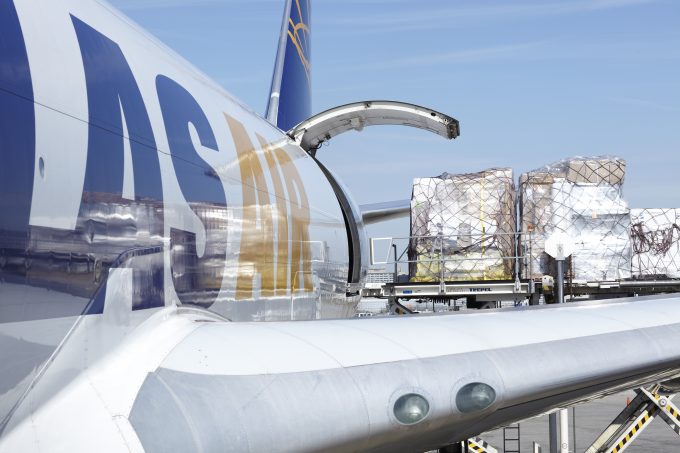CMA CGM Air Cargo finally launches transpac services
CMA CGM Air Cargo is finally launching transpacific services to the US, after it ended ...

Atlas Air has reported a loss of $7.5m for the third quarter, following a large cash pay-out to executives, and expenses relating to its deal with Amazon.
Income was $27.4m, down from $30.7m a year ago. Bill Flynn, CEO, said the results were “at the upper end of the range that we expected”.
Atlas Air’s cash reserves, which last year were $440m, were down to what one analyst described to The Loadstar as a “staggeringly low” $117.7m – “a huge issue”, he said. According to the 10Q form $78m of that cash is customer maintenance reserves, which generally must be returned to the customer upon applicable maintenance events.
The financial results, said the carrier, were “primarily due to the impact of non-deductible expenses, triggered by shareholder approval of warrants granted to Amazon…”
The deal, which saw Amazon gain warrants for 30% of the company, triggered a “change in control” clause – which itself triggered substantial executive payouts.
Atlas said it had paid $26.2m in expenses, for “accelerated compensation” awards for senior management, of which some $14m was in cash – much of which went to Mr Flynn.
Executives also received a pay-out following Atlas’s acquisition of Southern Air, although the company has not announced the amount paid.
Atlas not only paid cash for Southern, but is busy making good on its deal with Amazon, which requires significant investment in aircraft and pilots. While Atlas executives did not specify when exactly the remaining 19 aircraft would come into the fleet, it looks likely that the deal will not pay off until 2018. Only one Amazon aircraft will be operating during this peak season.
In an earnings call, Spencer Schwartz, CFO, noted that more cash would need to be spent on 767 conversions. “So over the next couple of years as we’re doing that, [it] hurts our cash, but then as soon as they come out, [we] will be able to back lever them. So that will have a big impact over the next couple of years.”
He added: “We have good expectations for the peak season that will certainly improve cash flows.”
Mr Flynn added that the company didn’t feel it needed as much cash as it had held in the past.
The results and earnings call will leave shareholders in some doubt as to when the Amazon deal will become profitable – and how profitable. It will be some 18 months before that becomes clear, although there is no denying it has already been profitable for executives.
The other concern noted by analysts was maintenance expenses. Atlas has seen declines of some 23% in maintenance expenses per block hour since 2014, but as its 747-8F aircraft get older, and the fleet grows, the bill is likely to increase significantly. While heavy maintenance is expected to be down in the fourth quarter, one analyst told The Loadstar: “I think we could see a tidal wave of maintenance expense in 2017. I don’t believe they can grow the fleet materially like they have and keep maintenance expense steady as well.”
Atlas’ pilots, who are currently demanding fairer pay and are in negotiations with management, called on the company “to do what’s in the best interest of customers, investors, pilots and the company’s bottom line”.
“While AAWW attributed much of its loss this quarter to millions of dollars in executive pay-outs around the Amazon deal, the company is choosing to avoid its growing shortage of pilots that will have a devastating and long-term financial impact on shareholders and customers,” said pilot Captain Robert Kirchner, executive council chairman of APA Teamsters Local 1224.
But Mr Flynn, who said Atlas had hired 350 pilots this year, told analysts that “our goal is to be an employer [of] choice, [and] I think we are”.
“We do of course need to hire more pilots in 2017 for growth with Amazon, as we’ve already talked about, we have some retirements as well and maybe a bit of attrition.”
Rival ATSG, which has a similar deal with Amazon – but not one that triggered a change in control – also reported third quarter results. Revenues increased 36% to $193.3m, while adjusted earnings from continuing operations for the third quarter increased to $8.7m.
ATSG also said the Amazon deal had a “significant impact” on its financial results.
Joe Hete, CEO, added: “In our airlines, costs associated with expansion of our operations continue to affect the profitability of those businesses. In particular, our third quarter results were adversely impacted by premium pay to ABX Air pilots, despite an aggressive crewmember recruiting program and rigorous training schedule. We estimate that this additional compensation, along with ongoing training, negatively impacted our pre-tax results by approximately $6.5m for the third quarter.”
Capital spending for the first nine months of 2016 was $182.m, compared with $111.0 million a year earlier. ATSG expects 2016 capital expenditures of some $285m, down $30m from prior guidance.
ATSG currently has similar disagreements with pilots uinons. It has started court action in the US against two unions who want the company’s subsidiary cargo airlines, ABX Air and Air Transport International, to be defined as a single system. It said it wanted “to avoid imminent interruptions”.
Comment on this article